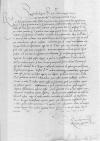Reverende in Christo Pater, sincere nobis dilecte.
Gratum nobis fuit et iucundum cognoscere ex cf. Ioannes DANTISCUS to Sigismund I Jagiellon 1538-04, CIDTC IDL 7172, letter lost⌊litteriscf. Ioannes DANTISCUS to Sigismund I Jagiellon 1538-04, CIDTC IDL 7172, letter lost⌋
Paternitatis Vestrae, quod multo iam sit, quam fuit antea, confirmatior, idque non tam ea de causa, quod illius opera opus nunc habemus, quam quod omnia laeta et prospera Paternitati Vestrae ex animo optamus. Et quidem tanto magis, quanto maius illius studium et alacritatem perspiciemus in omnibus mandatis nostri exhauriendis.
Quo die Paternitatem Vestram in viam se dare velimus, iam procul dubio ex his litteris
cognovit, quas non ita pridem per cubicularium nostrum misimus. Maturato opus est neque vero dubium nobis est, quo studio et observantia erga nos est Paternitas Vestra, quin cum celeritatis res indigeat, nihil ei sit morae interpositura. Numerum equitum vellemus quidem esse copiosum, sed non tam de apparatu nunc laboramus, quam ut primo quoque tempore negotium hoc confici possit. Quare ne quid ea res profectionem Paternitatis Vestrae retardet, quod si nondum movit se loco, id eam quamprimum facere velimus.
Ceterum si quae apud serenissimum Ferdinand I of Habsburg (*1503 – †1564), from 1521 Archduke of Austria, from 1526 King of Bohemia and Hungary, Croatia and Slavonia as Ferdinand I, 1531-1558 King of the Romans, 1558-1564 Holy Roman Emperor; son of Philip I the Handsome and Joanna the Mad of Castile, a younger brother of Charles V of Habsburg⌊Romanorum regemFerdinand I of Habsburg (*1503 – †1564), from 1521 Archduke of Austria, from 1526 King of Bohemia and Hungary, Croatia and Slavonia as Ferdinand I, 1531-1558 King of the Romans, 1558-1564 Holy Roman Emperor; son of Philip I the Handsome and Joanna the Mad of Castile, a younger brother of Charles V of Habsburg⌋ tractanda inciderint, de quibus per nos non superinscribed⌈nonnon superinscribed⌉ est satis diligenter perscriptum, Vestrae Paternitatis iudicio arbitrioque committimus. Quamquam enim ipsa pro sua modestia ingenio suo diffidit, spectatum tamen nobis id satis est et probatum multis in rebus arduis, quas nostro nomine tractavit, nullum ut onus a nobis Paternitati Vestrae imponi posse existimemus, quod non viribus ingenii sui sustinere queat, nihilominus si quid eiusmodi inciderit, quod magnam aliquam dubitationem afferre possit, facile patiemur de eo ad nos referri, cum non procul Wrocław (Breslau, Vratislavia), city in southwestern Poland, on the Oder river, historical capital of Silesia, from 1526 ruled by the Habsburgs⌊WratislaviaWrocław (Breslau, Vratislavia), city in southwestern Poland, on the Oder river, historical capital of Silesia, from 1526 ruled by the Habsburgs⌋ sumus afuturi.
Illud ante omnia postulamus, ut nihil cunctetur Paternitas Vestra atque id modis omnibus contendat et elaboret, ut serenissimum dominum Ferdinand I of Habsburg (*1503 – †1564), from 1521 Archduke of Austria, from 1526 King of Bohemia and Hungary, Croatia and Slavonia as Ferdinand I, 1531-1558 King of the Romans, 1558-1564 Holy Roman Emperor; son of Philip I the Handsome and Joanna the Mad of Castile, a younger brother of Charles V of Habsburg⌊Romanorum regemFerdinand I of Habsburg (*1503 – †1564), from 1521 Archduke of Austria, from 1526 King of Bohemia and Hungary, Croatia and Slavonia as Ferdinand I, 1531-1558 King of the Romans, 1558-1564 Holy Roman Emperor; son of Philip I the Handsome and Joanna the Mad of Castile, a younger brother of Charles V of Habsburg⌋ Wrocław (Breslau, Vratislavia), city in southwestern Poland, on the Oder river, historical capital of Silesia, from 1526 ruled by the Habsburgs⌊WratislaviaeWrocław (Breslau, Vratislavia), city in southwestern Poland, on the Oder river, historical capital of Silesia, from 1526 ruled by the Habsburgs⌋ reperire queat. Quo celerius rem confecerit, hoc a nobis gratiam inibit maiorem. Cupimus enim vehementer illam ad tempus venire. Quam bene valere optamus.


 BNW, BOZ 953, f. 163v.
BNW, BOZ 953, f. 163v.